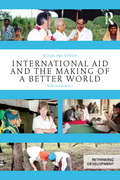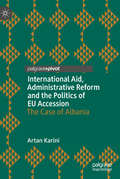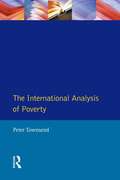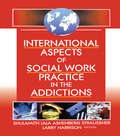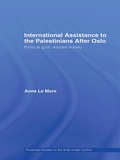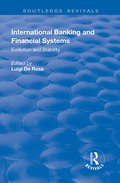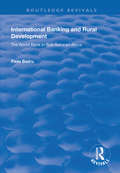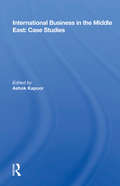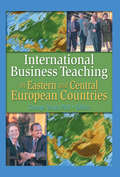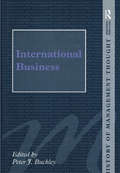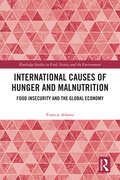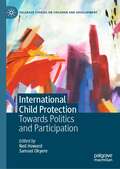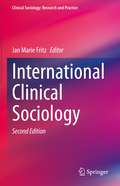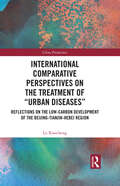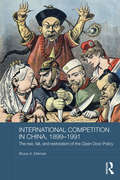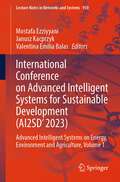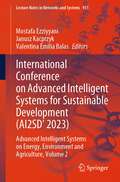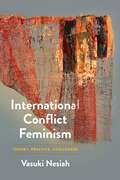- Table View
- List View
International Aid and the Making of a Better World: Reflexive Practice (Rethinking Development)
by Rosalind EybenHow can international aid professionals manage to deal with the daily dilemmas of working for the wellbeing of people in countries other than their own? A scholar-activist and lifelong development practitioner seeks to answer that question in a book that provides a vivid and accessible insight into the world of aid – its people, ideas and values against the backdrop of a broader historical analysis of the contested ideals and politics of aid operations from the 1960s to the present day. Moving between aid-recipient countries, head office and global policy spaces, Rosalind Eyben critically examines her own behaviour to explore what happens when trying to improve people’s lives in far-away countries and warns how self-deception may construct obstacles to the very change desired, considering the challenge to traditional aid practices posed by new donors like Brazil who speak of history and relationships. The book proposes that to help make this a better world, individuals and organisations working in international development must respond self-critically to the dilemmas of power and knowledge that shape aid’s messy relations. Written in an accessible way with vignettes, stories and dialogue, this critical history of aid provides practical tools and methodology for students in development studies, anthropology and international studies and for development practitioners to adopt the habit of reflexivity when helping to make a better world.
International Aid, Administrative Reform and the Politics of EU Accession: The Case of Albania
by Artan KariniThis book provides a detailed analysis of the dimensions and dynamics of the role of international aid in the reform and capacity development of public service in post-communist Albania. It challenges the technocratic, results-based management frameworks used by aid organizations and reports of official donors operating in the country context, and offers a qualitative and critical assessment of the role of aid in administrative reform and capacity building. Secondly, the book highlights the specificity of the national politico-administrative context and its ability to modify the process of policy transfer from aid organizations to the Albanian bureaucracy. In doing so, it illustrates the domestic challenges in the transfer process towards policy learning and makes a valuable contribution to the debate over the (voluntary vs. coercive) administrative reform in Southeast Europe in relation to the politics of EU accession.
International Analysis Poverty
by Peter TownsendFirst published in 1993. The scientific and political debate about poverty has been changing fast -with dramatic implications for intellectual interpretation and action by governments- and the intention in publishing this volume is to contribute to that debate. Scientists concerned to analyse poverty have been thrust by events into greater international service. But there are sinister forces at work which are seeking to divert them into petty issues, to blame the victims of poverty, or to cut them off from the resources or opportunities to investigate and report freely. This book is born of that frustration - and represents the changing debate during the late 1980s and early 1990s.
International Aspects of Social Work Practice in the Addictions
by Shulamith L Straussner Larry HarrisonExamine the worldwide phenomenon of substance abuse and addiction! International Aspects of Social Work Practice in the Addictions examines current social work practice in the addictions around the world. Researchers and practitioners address the abuse of and addiction to alcohol and other drugs and the current policies impacting the treatment of these substances in different countries. The book looks at the substances abused, the scope of the problems, the social reactions, the treatment approaches, and the role of professionals in addressing issues unique to each country, providing a more critical understanding of the socioeconomic and cultural influences on treatment systems. International Aspects of Social Work Practice in the Addictions presents cross-cultural perspectives on the effects of substance abuse and addiction on social policies, institutional practices, sources of funding, and social work methods. The book examines the rapid social changes that go hand in hand with increased rates of psychoactive substance problems and recognizes addiction as a complex biopsychosocial phenomenon that responds to intervention. The countries represented by the book's contributors include: Israel Ireland Germany Australia Singapore the Netherlands the United Kingdom the former Soviet Union and the United States International Aspects of Social Work Practice in the Addictions also includes book reviews related to cultural issues and a roundtable discussion concerning the legalization of drugs with perspectives from Australia, the United Kingdom, and the United States. This unique book is a vital resource for clinicians, academics, and researchers.
International Assistance to the Palestinians after Oslo: Political guilt, wasted money (Routledge Studies on the Arab-Israeli Conflict)
by Anne Le MoreWhy has the West disbursed vertiginous sums of money to the Palestinians after Oslo? What have been donors’ motivations and above all the political consequences of the funds spent? Based on original academic research and first hand evidence, this book examines the interface between diplomacy and international assistance during the Oslo years and the intifada. By exploring the politics of international aid to the Palestinians between the creation of the Palestinian Authority and the death of President Arafat (1994-2004), Anne Le More reveals the reasons why foreign aid was not more beneficial, uncovering a context where funds from the international community was poured into the occupied Palestinian territory as a substitute for its lack of real diplomatic engagement. This book also highlights the perverse effects such huge amounts of money has had on the Palestinian population and territory, on Israeli policies in the occupied Palestinian territory, and not least on the conflict itself, particularly the prospect of its resolution along a two-state paradigm. International Assistance to the Palestinians after Oslo gives a unique narrative chronology that makes this complex story easy to understand. These features make this book a classic read for both scholars and practitioners, with lessons to be learned beyond the Israeli-Palestinian conflict
International Banking and Financial Systems: Evolution and Stability
by Luigi De RosaThis title was first published in 2003. In this volume of essays - based on papers delivered to 2001 conference, International Banking and Financial Systems - leading European bankers and banking historians give their assessment of the evolution of central banking in 20th-century Europe. As well as providing a historical perspective, the volume also explores how the lessons of the 20th century may be brought to bear on current and future trends in central banking. In so doing, this volume provides an insight into the ways in which economic stability and growth has been, and can be, promoted.
International Banking and Rural Development: The World Bank in Sub-Saharan Africa (Routledge Revivals)
by Pade BadruPublished in 1998, this book reviews two of the World Bank's agricultural development projects in southeast Nigeria, and concludes that the objectives of these projects - which include reducing rural poverty and developing indigenous capacity for rural development - have not been fully realized. This book concludes that what these projects have achieved in the past, was the increasing integration of the peasant's political economy into the world's capitalist market with negative consequences. For example, the projects emphasis on export crop production, as opposed to food production, simply led to a diminishing capability among peasant farmers especially in the project areas, to produce food for themselves - while at the same time, reporting increased productivity in export-related production. The end result is widespread poverty amongst the poorest strata of peasant farmers participating in the program. In addition, the book looks at the Bank's structural adjustment programme, which in fact has the potential to reduce whatever benefits its agricultural programs might bring about for peasant producers.
International Business In The Middle East: Case Studies
by Ashok KapoorThis book, designed for academic and business communities, discusses the dimensions of business development in the Middle East. It identifies distinguishing features, calls for attention to the human resources needs of an operation and the special requirements of host governments.
International Business Teaching in Eastern and Central European Countries
by George Tesar Erdener KaynakFind out which business teaching techniques work and which don&’t for Central and Eastern European studentsFrom editor George Tesar: “Educational opportunities in Central and Eastern Europe have changed dramatically over the last twelve years. The restructuring of undergraduate and graduate programs has required a systematic rethinking of programs, courses, and teaching methods. Postgraduate education--particularly professional education and especially management education--has evolved as one of the most important elements impacting the political, social, and economic changes in that part of the world.”With this essential book, you'll explore the latest international business and management concepts that are being taught to potential managers and executives in Eastern and Central Europe. Edited by an internationally recognized expert in business management and education, International Business Teaching in Eastern and Central European Countries examines the way the economic structures of nations in transition impact the management curriculum, and looks at ways to stimulate economic development in transition economies.This thoughtfully indexed, well-referenced book also: illuminates the learning process for business students in that region suggests ways to help Eastern and Central European students get the most from case studies and business game simulations explores ways to use collaborative learning instruments when teaching entrepreneurship shows how to use networking as a vital part of increasing the management knowledge of a community or nation examines how existing companies can be used as business laboratories for teaching discusses the roles of free-market processes and government intervention in transition economies
International Business in China (International Business Series)
by Oded Shenkar Lane KelleyInternational Business in China looks at the inner workings of business in China. Each sector is explored in detail against the broader cultural context and regional variations. Throughout, the focus is on the political changes which have taken place in recent years and how this has affected business both within China and the firms interacting with her on an international level. The contributors are all well known for their expertise in international business and have had extensive experience with business in China on a domestic and international level. They provide an excellent blend of succinct analysis and practical guidelines for those interested in discovering more about international business in China.
International Business: Economics And Anthropology, Theory And Method (Routledge Revivals Ser.)
by Peter J. BuckleyThis book was published in 2003.Over the years the challenges of international business in organisation and culture have been one of the most intriguing issues facing managers. Attempts at organisational innovation have tried to strike a balance between local markets' responsiveness and global efficiency. This book presents an overview of changing attitudes to the globalization of the firm and traces the increasing sophistication of management techniques necessary to cope with the increasing complexity of business world wide. It contains readings on the management of international business from 1936 to 1998. Looking at managing abroad and the internationalism of firms including issues of appraising foreign investment opportunities, the foreign investment decision process and the evolution of the multinational enterprise. The operations and planning of the multinational firm are surveyed over time from early models of "Headquarters and Subsidiary" to global strategies. The key issues of international strategic alliances and joint ventures are also examined; concluding with approaches to forward looking international management.
International Capital Flows in Calm and Turbulent Times
by Stephany Griffith-Jones Ricardo Gottschalk Jacques CaillouxInternational Capital Flows in Calm and Turbulent Times analyzes the financial crises of the late 1990s and draws attention to the type of lenders and investors that triggered and deepened the crises. It concentrates on institutional investors and banks and provides detailed analysis of the countries most affected by the 1997-98 Asian financial crisis as well as the Czech Republic and Brazil. It also suggests necessary international financial reforms to make crises less likely. The book is unique in its scrutiny of the type of lenders and investors that triggered and deepened the crises, focusing particularly on institutional investors and banks; allocation of their assets; the criteria used in this process; and the impact of the nature of the investor on the volatility of different types of capital flow. It addresses such questions as: What determines or triggers massive changes in perceptions and sentiment by different investors and leaders? To what extent does contagion spread not just among countries but between actors? What are the policy implications of this analysis? The book concludes by examining the asymmetries in the financial architecture discussions and implementation and by offering policy proposals.
International Case Studies of Terrorist Rehabilitation (Routledge Studies in the Politics of Disorder and Instability)
by Rohan Gunaratna Sabariah M. HussinThe post 9/11 era has produced structured rehabilitation programmes in a wide range of countries including Saudi Arabia, Singapore, Pakistan, Malaysia, Egypt, Iraq, and Uzbekistan. There are also ad hoc and emerging programmes in Nigeria, China, Indonesia, Bangladesh, Denmark, Germany, United Kingdom, and Nepal. Due to the threat from global Islamist terrorist groups, including al-Qaeda and the Islamic State (IS), the focus has tended to be on Islamist groups. However, Sri Lanka also has a multifaceted rehabilitation programme that was created after the ethno-nationalist Liberation Tigers of Tamil Eelam (LTTE) group was defeated in 2009, which can teach us some valuable lessons. This book consists of a series of case studies of different terrorist rehabilitation initiatives that have been attempted around the world. Each initiative is critically analysed to develop a sound understanding of the significance of different approaches and strategies of terrorist rehabilitation in helping potential terrorists integrate back into society. Sharing and examining case studies, by both practitioners and scholars, this book provides vital tools to address the challenges faced by practitioners of terrorist rehabilitation programmes.
International Cases in Forensic Psychology: Inside the Criminal Mind
by K. Jayasankara ReddyThis book provides an in-depth investigation of different psychological phenomena in forensic psychology through an analysis of key case studies in the field.There is a growing requirement for a comprehensive resource that provides practical examples of how forensic psychology models are applied in real-life situations. Filling this lacuna, International Cases in Forensic Psychology takes the reader through a series of prominent case studies that illustrate the intricate details of criminal investigations, judicial proceedings, and correctional settings. Drawing on a diverse range of examples from the US, UK, Belgium, Russia, Columbia, Germany and India which include serial murder, financial deception and maternal psychosis, Dr. K. Jayasankara Reddy applies psychological theories and methods to understand the intricacies of criminal conduct. These theories range from criminal profiling and behavioral analysis, to the psychology of deceit and the dynamics of influence. Overall, the book will enhance the reader’s ability to analyses the fundamental reasons behind criminal behaviour and develop more efficient approaches for rehabilitating offenders.International Cases in Forensic Psychology will be of great interest to students and professionals of forensic psychology, neuropsychology, criminal justice, and related fields.
International Causes of Hunger and Malnutrition: Food Insecurity and the Global Economy (Routledge Studies in Food, Society and the Environment)
by Francis AdamsThis book examines the international causes of hunger and malnutrition and reveals how critical elements of the global economy heighten food insecurity in the developing world.At present, over two billion people in the developing world do not have secure access to safe, sufficient, and nutritious food. With the global population projected to rise to almost 10 billion by 2050, ensuring universal access to food will become increasingly urgent. The global community will need to redouble its efforts to effectively address the underlying causes of food insecurity. Within countries, a number of causes – poverty, poor governance, civil conflict, environmental decline - are immediately apparent and must be addressed to have any hope of lessening hunger and malnutrition. At the same time, a number of other factors well beyond national borders often constitute equal or greater obstacles to meeting the nutritional needs of all people. These factors are not nearly as visible and are largely outside the control of individual countries and local communities. This book examines how core elements of the global economy cause, prolong, and intensify food insecurity in the developing world. Emphasis is placed on agricultural trade, seed privatization, transnational land acquisitions, industrial fishing, and climate change. Understanding how these five factors impact the poorest communities in the poorest countries is essential for constructing an equitable, inclusive, and sustainable global food system that meets the nutritional needs of all people. By highlighting five major international causes of hunger and malnutrition, this book offers an alternate framework for understanding and combatting global food insecurity.This book will be of particular interest to students, scholars, and practitioners in the fields of global food security, international development, and global political economy.
International Child Protection: Towards Politics and Participation (Palgrave Studies on Children and Development)
by Neil Howard Samuel OkyereThis book interrogates the international child protection regime, with a particular focus on its weaknesses and failures. It looks at the lack of accountability, the normativity, and the tendency to recreate patterns of power and exclusion that blight otherwise good intentions. The book assesses why the regime falls short of its ideals and offers ideas for what can be done to improve it. Bringing together influential, established voices, and emerging scholars who work on issues related to childhood, youth, policy, and practice, the book offers a timely intervention that aims to push the world of international child protection in more progressive directions.
International Clinical Sociology (Clinical Sociology: Research and Practice)
by Jan Marie FritzClinical sociology is a multidisciplinary field that seeks to improve life situations for individuals and groups. This book showcases the art and science of clinical sociology from around the world. It is the first book to present basic clinical sociology diagrams and models in addition to detailed histories of clinical sociology in the United States, Quebec, France, and Japan. A range of interventions are discussed in light of a region’s economic, social, political, and disciplinary history. The book presents illustrative case studies from leaders in the field, and it serves the need of graduate-level courses from around the world.
International Collaborations In Behavioral And Social Sciences: Report Of A Workshop
by National Research Council of the National AcademiesBased on the outcomes of a workshop convened by the U.S. National Committee for Psychological Science and informed by a survey of social scientists who have led cross-national projects, this National Science Foundation-funded report addresses the multiple benefits of research extending across national boundaries and describes factors common among successful collaborations. Workshop participants identified the obstacles frequently encountered and suggested ways of dealing with these challenges to enhance international collaborative research in the behavioral and social sciences. Several dimensions of collaborative processes, such as research planning, methodological issues, organizational concerns, varied training approaches, and funding needs receive critical attention in this book.
International Communication: A Reader
by Daya Kishan ThussuThis comprehensive Reader brings together seminal texts in media and communication from both traditional as well as more recent scholarship. <p><p> Readings are drawn from an international range of scholars and organized to reflect the growing internationalization of the field, with clearly defined sections covering key aspects of global communication. In addition to the core academic readings, key policy documents are also included to demonstrate the development of the political, economic and technological infrastructure that underpins the global system of media and communication.
International Community Organising: Taking Power, Making Change
by Dave Beck Rod PurcellAs the Arab Spring continues to work through changes, the Occupy Movement is agitating for change and many are looking for alternatives in the face of global financial and political challenges, community organising offers a realistic way forward for many communities: a tried and tested way of improving people’s lives. This book is the first to explore the diverse history of community organising, telling stories of how it developed, its successes and failures, and the lessons that can be applied today. It analyses contemporary examples of practice from the USA, UK, India, South Africa, Cambodia and Australia against both wider theoretical frameworks and their ability to contribute to sustainable social change. It will be useful for a wide range of practitioners, students and researchers engaged in the struggle to develop new ways of doing community.
International Comparative Perspectives on the Treatment of “Urban Diseases”: Reflections on the Low-Carbon Development of the Beijing-Tianjin-Hebei Region (China Perspectives)
by Lu XiaochengWith an integration of theories, comparative and empirical studies, this book aims to find a treatment for Beijing’s “urban diseases” and coordinate a low-carbon development plan for the Beijing-Tianjin-Hebei region in China. Unprecedented industrialization and unconventional urbanization caused a series of “urban diseases” for developing cities across the globe. By summarizing and exploring the evolution and phased characteristics of “urban diseases”, the author implements theories across classical sociology, human ecology, community school, and low-carbon city as the base for policy recommendations. This book also provides in-depth examinations and comparative studies of other metropolises’ experiences in controlling “urban diseases”. Cities such as New York, London, and Tokyo were modeled to propose the most appropriate low-carbon development plan for the Beijing-Tianjin-Hebei region. With a focus on developing cities in Northern China, this book will be a great read to all scholars and students of environmental studies, development studies, urban studies, and contemporary China studies. It will also be a great addition for those who are interested in social conflicts and economic development.
International Competition in China, 1899-1991: The Rise, Fall, and Restoration of the Open Door Policy (Routledge Studies in the Modern History of Asia)
by Bruce A. EllemanChina's recent economic reforms have opened its economy to the world. This policy, however, is not new: in the late nineteenth century, the United States put forward the Open Door Policy as a counter to European exclusive 'spheres of influence' in China. This book, based on extensive original archival research, examines and re-evaluates China's Open Door Policy. It considers the policy from its inception in 1899 right through to the post-1978 reforms. It relates these changes to the various shifts in China’s international relations, discusses how decades of foreign invasion, civil war and revolution followed the destruction of the policy in the 1920s, and considers how the policy, when applied in Taiwan after 1949, and by Deng Xiaoping in mainland China after 1978, was instrumental in bringing about, respectively, Taiwan's 'economic miracle' and mainland China’s recent economic boom. The book argues that, although the policy was characterised as United States 'economic imperialism' during the Cold War, in reality it helped China retain its sovereignty and territorial integrity.
International Conference on Advanced Intelligent Systems for Sustainable Development: Advanced Intelligent Systems on Energy, Environment and Agriculture, Volume 1 (Lecture Notes in Networks and Systems #930)
by Janusz Kacprzyk Valentina Emilia Balas Mostafa EzziyyaniThis book is a comprehensive compilation of groundbreaking insights stemming from the esteemed International Conference on Advanced Intelligent Systems for Sustainable Development (AI2SD'2023), hosted at Cadi Ayyad University Morocco. Focused on the crucial themes of energy, environment, agriculture, and industry, this book captures the essence of transformative discussions and cutting-edge research that unfolded during the conference. Within these pages, readers are invited to explore the intricate world of intelligent systems, where innovation converges to tackle the key challenges of sustainability. The book immerses its audience in a wealth of knowledge that deeply represents the latest advancements shaping the future landscape. Diverse topics are intricately woven into the fabric of this discourse, covering AI-driven solutions designed for energy optimization, environmental sustainability, precision agriculture, and intelligent industry applications. Each contribution serves as a testament to the collaborative efforts of researchers, practitioners, and experts who gathered to drive innovation at the intersection of intelligent systems and sustainable development. Crafted as an invaluable resource, 'Advancements in Intelligent Systems: AI2SD'2023 Proceedings‘ caters to a diverse readership eager to delve into the forefront of trends and developments emerging from the crossroads of advanced intelligent systems in energy, environment, agriculture, and industry. Whether you're a researcher, practitioner, or enthusiast, unlock the transformative potential inherent in these innovative domains.
International Conference on Advanced Intelligent Systems for Sustainable Development: Advanced Intelligent Systems on Energy, Environment and Agriculture, Volume 2 (Lecture Notes in Networks and Systems #931)
by Janusz Kacprzyk Valentina Emilia Balas Mostafa EzziyyaniThis book is a comprehensive compilation of groundbreaking insights stemming from the esteemed International Conference on Advanced Intelligent Systems for Sustainable Development (AI2SD'2023), hosted at Cadi Ayyad University Morocco. Focused on the crucial themes of energy, environment, agriculture, and industry, this book captures the essence of transformative discussions and cutting-edge research that unfolded during the conference. Within these pages, readers are invited to explore the intricate world of intelligent systems, where innovation converges to tackle the key challenges of sustainability. The book immerses its audience in a wealth of knowledge that deeply represents the latest advancements shaping the future landscape. Diverse topics are intricately woven into the fabric of this discourse, covering AI-driven solutions designed for energy optimization, environmental sustainability, precision agriculture, and intelligent industry applications. Each contribution serves as a testament to the collaborative efforts of researchers, practitioners, and experts who gathered to drive innovation at the intersection of intelligent systems and sustainable development. Crafted as an invaluable resource, 'Advancements in Intelligent Systems: AI2SD'2023 Proceedings‘ caters to a diverse readership eager to delve into the forefront of trends and developments emerging from the crossroads of advanced intelligent systems in energy, environment, agriculture, and industry. Whether you're a researcher, practitioner, or enthusiast, unlock the transformative potential inherent in these innovative domains.
International Conflict Feminism: Theory, Practice, Challenges (Pennsylvania Studies in Human Rights)
by Vasuki NesiahAnalyzes the impact of International Conflict Feminism’s alliance with powerful global institutionsIn this book, Vasuki Nesiah tells the story of the astonishing uptake of International Conflict Feminism (ICF) in the most powerful institutions of global governance. ICF refers to a repertoire of policy agendas and legal strategies allied with those institutions to focus on women’s vulnerabilities, fight impunity for sexual violence, and promote women’s roles in peace-building processes. ICF emerged from feminist networks anchored in the Global North that gained momentum in the aftermath of the Cold War. Although this volume offers a testament to ICF’s remarkable success, it also analyzes how this success was intertwined with the defeat of alternative visions and agendas, including a range of dissident and heterodox feminisms that were eclipsed as ICF gained traction.Emerging from Nesiah’s dual occupations in academia and international law and policy practice, International Conflict Feminism shows how centrally the ICF agenda has shaped fields such as peace building, international criminal law, transitional justice, and post-conflict economic policy. Each section pauses at different sites in the international governance architecture to analyze the distributive impact of ICF and its allied global policy agendas to examine what is privileged, legitimized, and empowered, and what is subordinated, marginalized, and further excluded.ICF is a project of ideas and passions, legal proposals, and policy orientations. Today, when the most powerful countries of the world are describing their military, economic, and political interventions as a “feminist foreign policy,” the task of understanding and assessing the ICF project is especially urgent. Nesiah argues that, rather than obfuscating and denying the power of the ICF agenda, grappling with ICF’s power is essential to achieving solidarity with feminisms that don’t have a seat at the table, in particular those dissident feminist traditions with priorities and interests that challenge the dominant world order and its injustices and hierarchies.
